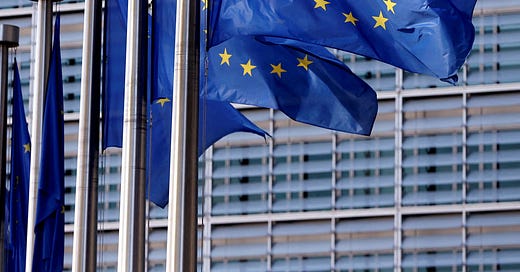Navigating the EU Omnibus Proposal: Key Changes to CSRD You Need to Know
A Guide to the Latest Developments in the EU's Sustainability Reporting and Impact on Companies
The European Union's recent introduction of the Omnibus proposal has sent ripples throughout the sustainability reporting landscape. This proposal, aimed at amending the existing Corporate Sustainability Reporting Directive (CSRD), has sparked considerable debate and uncertainty in Europe and for organizations doing business there.
This newsletter provides a comprehensive overview of the Omnibus proposal, delving into its key provisions, potential implications, and possible next steps. We will explore the rationale behind the proposal, analyze its chances of approval, and offer insights into the evolving regulatory landscape.
Understanding the Omnibus Proposal
The Omnibus proposal is a legislative package designed to streamline and simplify sustainability reporting requirements for businesses operating within the EU. Key elements of the proposal include:
Reduced Reporting Scope: The proposal suggests reducing by 80% the number of companies obligated to report under the CSRD, primarily by exempting companies with fewer than 1,000 employees.
Simplified Reporting Requirements: The proposal aims to reduce the number of data points and prioritize quantitative over qualitative disclosures, potentially easing the reporting burden on companies.
Delayed Implementation Timelines: The proposal suggests delaying the reporting deadlines for certain companies, potentially providing more time for adaptation and compliance.
Taken together, these factors offer a significant step back from the in-depth and expansive reporting requirements introduced by the CSRD.
Key Drivers Behind the Omnibus Proposal
The introduction of the Omnibus proposal can be attributed to several factors, most notably geopolitical shifts and competitiveness concerns. Proponents of the Omnibus argue that by reducing reporting requirements and regulatory burden, the EU will remain more financially and industrially competitive. The current geopolitical climate, marked by economic uncertainties and shifting global priorities, as well as a rise in right-wing dominated governments, has prompted a reassessment of regulatory burdens on businesses.
The Road to Approval: How the EU Legislative Process are Developed and Passed
While many sources are addressing the Omnibus as though it is a done deal, this is far from the case. At this time, it is still a proposal, and ratification may take months or even years. The Omnibus proposal's journey to becoming law involves a multi-step process.
The Omnibus was drafted by the European Commission, which is responsible for proposing new legislation. It was then submitted and is currently pending review by the European Parliament and the Council of the European Union. This review process begins with a first reading, during which the Parliament and Council may propose amendments or approve the proposal as is. If both agree, the proposal becomes law. If disagreements persist, a second reading is initiated, potentially leading to further negotiations and revisions. In rare cases, a proposal may require further deliberation. In this case, a Conciliation Committee is formed to resolve the remaining differences between the Parliament and Council.

The approval process is typically quite lengthy, and there is no legal deadline for both Parliament and Council to review it. In this case, it is expected to take approximately 1-1.5 years, with the possibility of further delays.
Potential Scenarios and Implications
Several scenarios could emerge from the Omnibus proposal. The first, and most simple, is that the proposal may not be approved, leaving the existing CSRD in effect as is. However, based on the current makeup of the EU Parliament and Council, this is unlikely. Instead, one of the following three scenarios is expected:
The proposal may be approved with changes to the reporting scope, requirements, or timelines.
Omnibus is approved as is but does not enter into force in the member states before the next reporting deadline.
Or the implementation of the Omnibus proposal may be delayed, potentially affecting reporting deadlines.
An important point to consider is that, in some of the scenarios outlined above, if the Omnibus proposal is approved (with or without changes), what will happen to countries that have already incorporated the CSRD?
According to EU law, when the EU institutional triangle approves a legislative proposal, each country must determine how to transpose it into national legislation. Governments may choose to amend, repeal, or retain existing laws based on decisions made by EU institutions, leading to variations in implementation across different jurisdictions. As a result, companies should closely monitor regulatory developments in the countries where they operate.
The proposed Omnibus changes still require review, approval, and implementation by the EU Parliament, Council, and individual Member States. Until then, the CSRD remains in effect. The uncertainty around the proposal’s final form and timeline creates challenges for businesses, making it essential for companies to stay informed and adjust their sustainability reporting strategies accordingly.
How would the Omnibus proposal impact CSRD reporting?
The Corporate Sustainability Reporting Directive (CSRD) is a European regulation that standardizes ESG reporting to enhance consistency, comparability, and reliability across companies. It expands disclosure requirements, ensuring transparency on sustainability impacts, risks, and opportunities. The CSRD applies to a broader range of companies, reinforcing accountability in corporate sustainability.
If the Omnibus proposal is passed, it would significantly affect not only which companies are required to comply with the CSRD reporting standards, but also what they are required to report on and when.

Recommendations
In light of the Omnibus proposal, businesses should consider the following recommendations:
Large Companies: Companies that would be expected to report even should Omnibus be approved should continue their reporting preparations, as the proposal's impact on them is likely to be minimal.
Potentially Out-of-Scope Companies: Companies that may be exempt from reporting under the proposal should still consider completing their double materiality assessments (DMA), as this provides valuable insights into their ESG risks and opportunities.
Small and Medium Enterprises (SMEs): Even if no longer mandated to report, SMEs should consider voluntary reporting frameworks to enhance their sustainability performance and stakeholder engagement.
Beyond the obligation to report under the CSRD or other sustainability frameworks, the alignment process brings strategic advantages to companies. It enhances brand recognition among consumers, sets businesses apart from competitors, and provides a comprehensive overview of operations that may be impacted by excessive costs or long-term strategic decisions, fostering more resilient and forward-thinking business strategies.
Conclusion
The EU Omnibus proposal could drastically alter the sustainability reporting landscape; already it is sparking discussions and raising concerns among businesses and stakeholders. While the proposal ultimately aims to simplify reporting requirements and reduce regulatory burdens, it also introduces significant uncertainty and challenges for businesses.
The Commission is already presenting the Omnibus proposal to both the European Parliament and the Council. The next step is for the Parliament to vote on the proposal, followed by the Council. There are no legally mandated deadlines for these votes.
Companies must stay informed about the proposal's progress, assess its potential implications, and adapt their sustainability reporting strategies accordingly. By proactively engaging with the evolving regulatory landscape, businesses can ensure compliance, mitigate risks, and leverage sustainability reporting as a driver of value creation. Be sure to follow Brightest and stay tuned for more updates on this process.
Disclaimer: This newsletter provides general information and should not be considered legal advice. Companies should consult with their legal and sustainability advisors for specific guidance on complying with the evolving regulatory requirements.
This Week in Sustainability is a weekly email from Brightest (and friends) about sustainability and climate strategy. If you’ve enjoyed this piece, please consider forwarding it to a friend or teammate. If you’re reading it for the first time, we hope you enjoyed it enough to consider subscribing. If we can be helpful to you or your organization’s sustainability journey, please be in touch.













